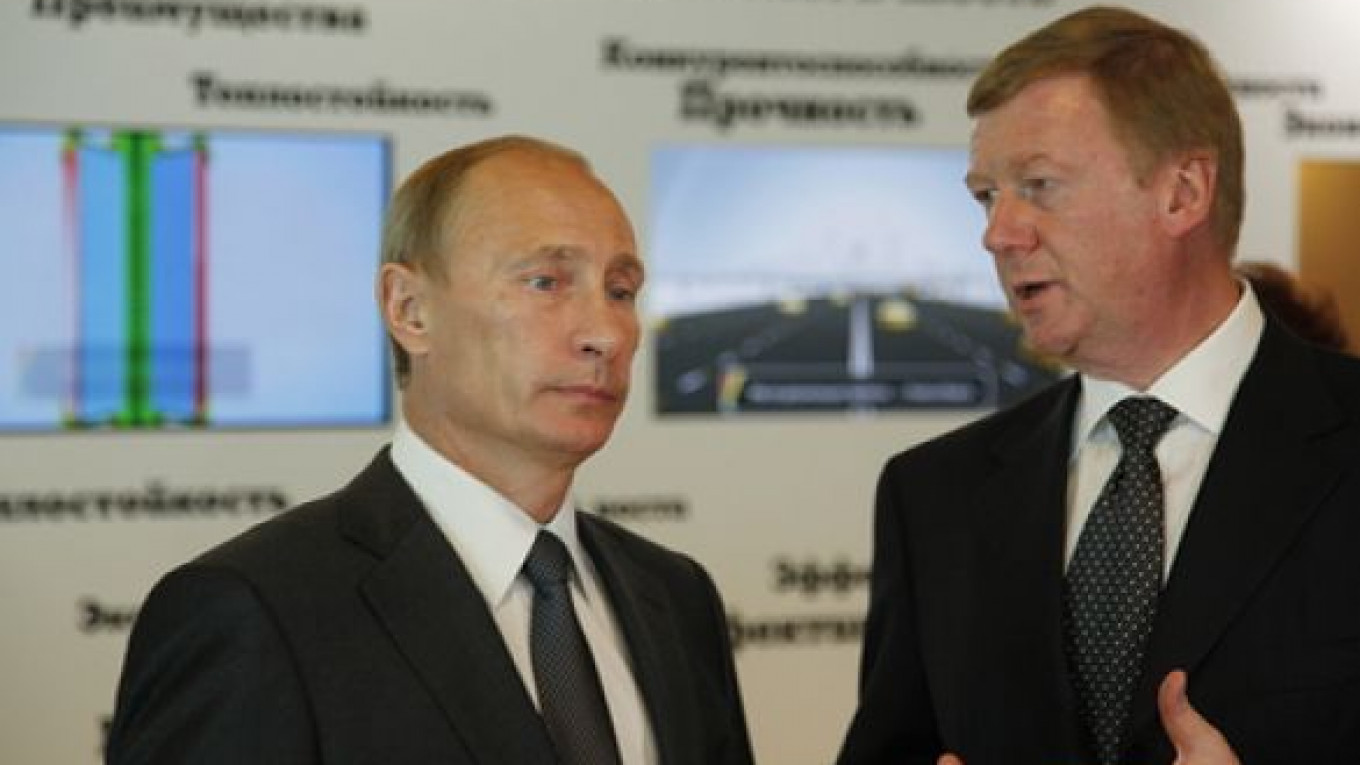The government's Audit Chamber on Friday accused state-owned Rusnano of multiple infractions in a blow to the high-tech corporation's chief, Anatoly Chubais.
The chamber's critical conclusions followed President Vladimir Putin's reproof of the company during a live call-in show the previous day.
Auditors made their statement after examining Rusnano's records in response to a request by Chubais' political nemesis, the Communist Party.
"The audit's materials attest that Rusnano's performance was inappropriate to attain the goals that it was entrusted with, which are the development of the national nano industry," the Audit Chamber said in a statement.
Chubais said he agreed with some of the criticism, but didn't elaborate.
"I don't feel that these complaints are contrived," he said at a news conference. "I don't suppose this is a conscious distortion of the situation."
Highlighting its conclusions about ineffective spending by Rusnano, the Audit Chamber singled out a solar battery project in the Irkutsk region, which received 14 billion rubles ($437 million) of investment from the company. Auditors said the venture was a failure that threatens social unrest in the area because the battery producer — faced with a lack of demand for its products — is cutting jobs.
Putin chided Rusnano for the same project Thursday, noting that there are "deficiencies" in the company's actions.
The chamber stated that Rusnano suffered cumulative losses of 24.3 billion rubles as of the end of last year, a number that the company said is overblown.
Auditors also said the company's overheads had been on the rise despite objections from its board. Salaries increased nine fold to the average of 593,000 rubles ($19,000) per person, the chamber said in the statement, appearing to refer to monthly pay.
The oversight agency also found that when Rusnano provided a 34.3 billion ruble loan, it took as collateral assets that weren't worth equivalent to the money lent.
In addition, Rusnano does not have any records to prove that its investments of 47 billion rubles into foreign assets were effective, auditors complained.
However, Rusnano rejected funding requests from some leading Russian research institutions, the Audit Chamber said without naming them.
The number of funding requests has been on the decline lately, indicating that potential partners have been losing interest in joint projects with the company, the chamber said.
Set up in 2007, Rusnano received 130 billion rubles from the federal budget to invest in high-tech projects. It spent more than 196 billion rubles since then.
Auditors said they are forwarding their findings to law enforcement agencies, including the Prosecutor General's Office and the Federal Security Service.
Auditor Sergei Agaptsov said separately that Rusnano is unlikely to achieve the goal of 300 billion rubles in annual sales of nano-tech products by the companies it co-owns in 2015 — the target that the government set for the company, Interfax reported.
Last year, sales were 23.4 billion rubles, he said. Rusnano expects the number to grow to 50 billion rubles this year. The companies in its portfolio sell products like paint components, glass and basalt building materials that can endure frigid temperatures.
Chubais has been one of the favorite punching bags for the Communist Party because of his role in post-Soviet privatizations.
"Old love doesn't get rusty," Chubais joked in reference to the Communist request to audit the company he runs.
The Audit Chamber uncovered ineffective spending by state-controlled Aeroflot, Interfax reported Friday. The spending that auditors labeled as ineffective amounted to 13.9 billion rubles in 2010, 2011 and the first nine months of 2012.
Contact the author at [email protected]
A Message from The Moscow Times:
Dear readers,
We are facing unprecedented challenges. Russia's Prosecutor General's Office has designated The Moscow Times as an "undesirable" organization, criminalizing our work and putting our staff at risk of prosecution. This follows our earlier unjust labeling as a "foreign agent."
These actions are direct attempts to silence independent journalism in Russia. The authorities claim our work "discredits the decisions of the Russian leadership." We see things differently: we strive to provide accurate, unbiased reporting on Russia.
We, the journalists of The Moscow Times, refuse to be silenced. But to continue our work, we need your help.
Your support, no matter how small, makes a world of difference. If you can, please support us monthly starting from just $2. It's quick to set up, and every contribution makes a significant impact.
By supporting The Moscow Times, you're defending open, independent journalism in the face of repression. Thank you for standing with us.
Remind me later.






